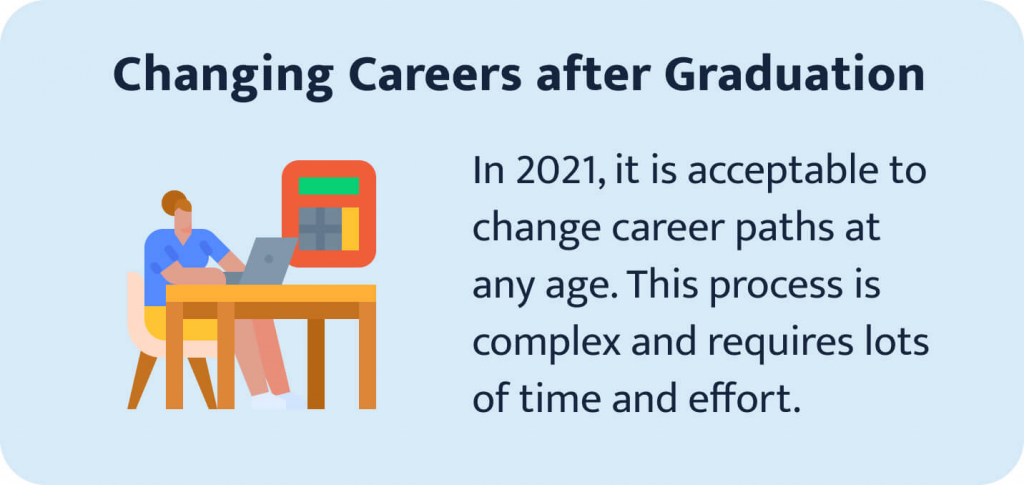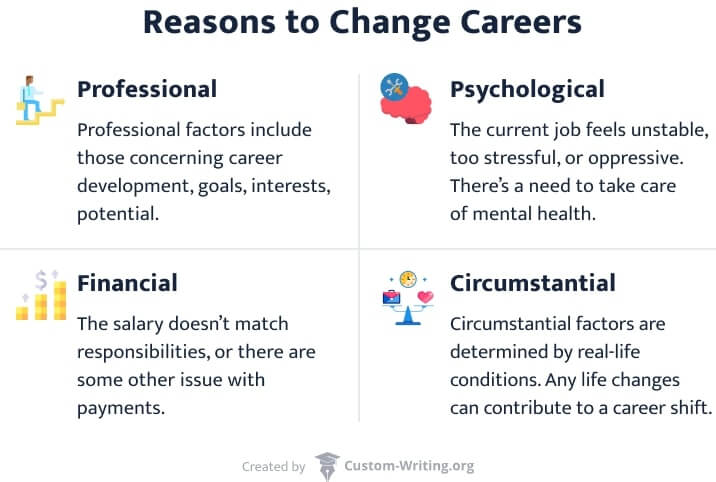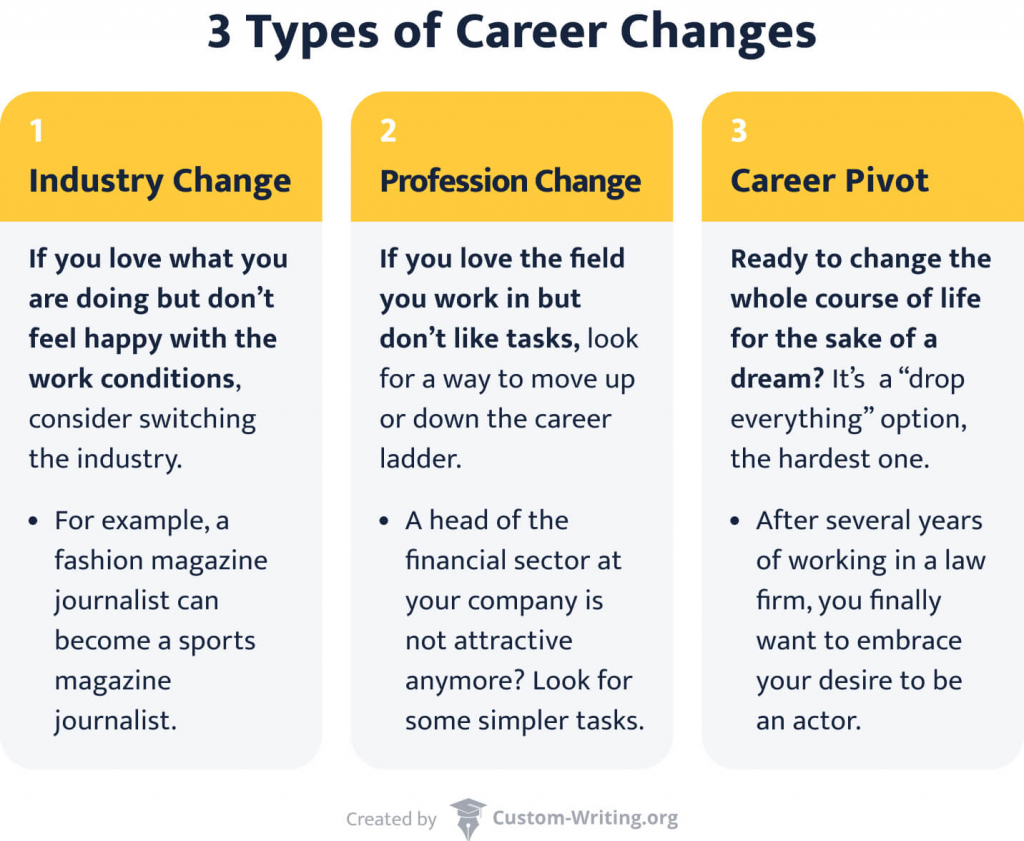
Let’s start with a liberating thought: it’s perfectly fine to change your career at any age.
The blog you are reading right now was created by a group of people from many different fields. Each of us is a professional who works for a common cause – this blog. However, we never studied for our current occupations at any college.
If you’re considering changing your career path, listening to your inner voice might help you.
However, the process is very challenging. Let’s start by examining it step by step.
First, we’ll try to help you understand why you want to change your job. Then we’ll touch upon several options you have moving forward.
This article will help you see your new path more clearly. Stay with us!
🤔 Why Do You Want to Change Your Path?
One day anyone could wake up with a clear idea that they don’t want to stay at their job anymore. Why does this happen?
Each of us may have completely different reasons for changing our course. We have divided the influencing factors into several groups: financial, professional, psychological, and circumstantial.
Understanding the roots may help you examine why you feel dissatisfied and how to choose the next steps on your path.

Professional Factors
You might have a feeling in your chest that tells you that your current job doesn’t fulfill you. Professional factors include those concerning your career development, goals, interests, and potential.
- You no longer find fulfillment in your current profession. Once you hit the ceiling in your field, it’s natural to want to grow. However, if you’ve already applied all your skills to the job and accomplished all the possible goals, then you might start to feel stagnant. In this case, you might need to look for a job promotion.
- Your skills don’t meet the demands of your career anymore. This can happen when you haven’t been trained in new skills for a long time. Or, vice versa, you might feel like you can offer much more than your current job requires.
- You found out that your company’s philosophy doesn’t match your worldview. Perhaps you have become inspired by a new philosophy. You might need to search for a place where your ideas mirror the company’s perspective.
- Your current position doesn’t allow for promotions. You’re eager to assume more responsibility and a higher salary, but the job is too basic and doesn’t offer any room to grow.
Psychological Factors
A healthy mental state is vital to performing well in your job and your life. If your career makes you feel extreme stress, then it’s time to make some changes.
- You didn’t choose your occupation. You might have been influenced by your parents or friends when deciding what to study at your university. Quite often, you can realize this in the middle of your career.
- Burn-out becomes a problem. When we stay at the same place for decades, it’s almost impossible to avoid burn-out. You may be sick of your duties and don’t feel passionate about your work anymore. If all you want is to have a rest – a career change can be a perfect choice.
- The environment is toxic. A friendly team doesn’t always come with a good salary and a satisfying job. If the environment is toxic and your colleagues are impossible to deal with, it’s better to spare your mental health and look for work somewhere else.
- You’re overwhelmed by stress. Your relationship with the team and CEO may be excellent, but what’s the point if the work itself brings you so much stress? Working late at night and dealing with constant emergencies is exhausting and can take its toll on your health.
Financial Factors
Money issues can significantly affect your career path. What might be the financial reasons pushing you to look for a new job?
- You want more money for your work. If your skills are growing, it’s normal to want to see an increase in your salary. Whether you feel valued enough at work depends greatly on the money you receive.
- It might be a question of a steadier paycheck. We all want to have a stable income. If you receive your salary with constant delays, you might want to start searching for a company that pays more consistently.
- Price wages VS time wages. You might not be satisfied with the format by which you receive your money. In that case, it’s better to look for a job with time wages instead of price wages. Of course, this depends on your preferences, but there are many suitable options out there.
Circumstantial Factors
Here we mention how real-life conditions can influence a career change. Sometimes a life change can contribute to the decision to change a career.
- Work-life balance. If you find that you lack time for yourself, your family, and your hobbies, then your work-life balance is probably disturbed. Your goal would be to find something less time-consuming.
- No possibility of a full-time job. Often women who recently have become mothers need more time at home. A freelance job can become the perfect solution in this case.
- New place – new job. When someone moves to another country, they might need to change their whole career plan. Their former occupation may not be in demand in the country to which they have moved.
- Bad things happen. We hope it’s not the case, but sometimes you might need more time to take care of a sick relative. Again, a remote or part-time job would help you in these circumstances.
- The situation may not depend on you. If your company was ruined due to a brutal economic hit, make sure you provide yourself a safe escape route.
🎯 What to Choose as Your New Career
Some people always have a plan. Even if they start from scratch, they clearly see the goal they want to follow.
But we are here to help those who are at a loss. These are the steps you should take!
Step#1 How to Choose?
- Start with approaching those who are successful in their fields. People can be a very precious resource. Use them!
- Make new acquaintances and manifest your wish to others. Who knows, maybe that guy you always see at the nearby cafe is your dream company’s CEO.
- Revise your CV. You might have gained new skills and completely forgotten about them. Take a fresh look at what you already can do and think of the skills you’d like to improve.
- Inquire about new vacancies at your current workplace. They may have a position that you’d love. Besides, they already know you and your capabilities, which could be an advantage.
- Bring your skills to a new level and prepare for the interviews. This will make you more confident. You may start to feel that you have to start from scratch, but don’t underestimate your background knowledge!
Before upgrading your skills, you need to evaluate them. There are great assessment tests that can help you choose the right path.
Personality Tests – help you learn more about yourself and your character traits. Such information can direct you towards the correct career:
Ten-Item Personality Inventory-(TIPI)
The Myers & Briggs Foundation – MBTI Basics
Skills Assessment Tests – assist you in better understanding whether you’ll succeed at a particular job or not. These tests are based on the evaluation of your capabilities:
Skills Matcher l CareerOneStop
Career Cluster Interest Survey | Minnesota State CAREERwise
O*NET Interest Profiler at My Next Move
Emotional Intelligence Testing is essential nowadays. We all work with people to some extent, and we should know how good we are at connecting and communicating with them.
Emotional Intelligence Test | Psychology Today
How Emotionally Intelligent Are You?
Step#2 What to Choose?
There are several different ways to change your career. Let’s talk about three of them: the same occupation at another company, the same industry but another occupation, and a complete change of both occupation and industry.
By choosing which of these options best suits your needs, you’ll be able to narrow down your choices, which will take you to your goal more quickly.

Changing Your Industry
If you love what you are doing but don’t feel happy with the work conditions and environment, you might need to consider switching the industry you work in.
Let’s say you work as a journalist at a sports magazine. You are fond of writing, interviewing people, and analyzing the news. However, you don’t enjoy sports topics at all. Perhaps you are much more interested in fashion. The right decision for you would be to search for vacancies in fashion magazines.
Or, for example, you are a psychologist at a school, but you’d prefer to work with adults. If this is the case, it’s time to leave the school and develop a new audience for your therapy consultations.
Changing Your Profession
You can also change position within the same industry. If you love the field you work in, look for a way to move up or down the career ladder. Finding a different job within the same industry can be great, even if you have to gain additional skills to fit the new position.
For example, you don’t want to be a contributor in a fashion editorial. You now want to become a chief editor. Or, perhaps, working as the head of the financial sector at your company has become exhausting, and you would like to complete simpler tasks. To make these kinds of changes, you should approach the HR department of your company.
Changing Everything
For those dare-devils who are ready to change the whole course of their life for the sake of a dream, there’s always a “drop everything” option. It’s the most painstaking route, but it could be worth it.
Let’s say your parents forced you to enter law school, but after several years of working, you finally want to embrace your desire to be an actor.
Or, for example, several years ago, you took whatever job you could find just to make a living. Now, finally, you are ready to make your real wish come true. You might quit your career at a cafe and go explore the world of software engineering.
👩🚀 How to Actually Make the Change
- First, try to understand the point of the upcoming change. Ask yourself why exactly you need to change your career.
- To plot your path, you should imagine what you want your future to look like. So, the question is: what is the job you want to do?
- Evaluate the amount of work you’ll need to do to pursue your goal.
- Build up a plan with detailed descriptions of the steps and different scenarios.
- Don’t forget to track your success. Thank yourself for each step you take.
- Take care of how you present yourself to potential employers. Stand out with your skills.
- Activate your contacts. Use your connections to discover the most exciting positions.
- Meet new people, especially those who are successful in the field you’d like to work in.
- Revise your resume and make sure it reflects you as a professional.
- Don’t be afraid to make mistakes. They are unavoidable. Be persistent, and you’ll get it!

🌟 Top 5 Inspirational Career Changes
If you were waiting for a sign – this is it.
Have you ever wondered if some famous professionals in different fields used to have other jobs? Here are five stories that prove that listening to yourself will pay off.
- Brad Pitt was not an actor his whole life. He used to drive strip dancers to parties in a limo. It sounds like a movie plot, but it’s not. Can you imagine Brad Pitt being a driver? However, one day, he enrolled in acting classes, and look – he has succeeded immensely!
- The singing idol Harry Styles was once a simple baker in his hometown. This story is all about decisiveness and self-confidence again. He started his journey to fame by going to an X-Factor audition. And now he’s one of the most popular singers in the world.
- When we watch movies with Whoopi Goldberg, we are amazed by her talent and charisma. What if we told you she used to work as an assistant for funerals? Her duties were to do the make-up and hairstyles for people who… passed away. What an irony! She switched to comedy films and has had tremendous success.
- Come on, Jeffrey, you can do it! The wealthiest person in the world didn’t always have billions of dollars. Jeff Bezos started his venture after he turned 31. Very promising for all of us who think about changing our careers after finishing university. Before, he worked in financial companies and computer science.
- When someone says the fashion industry is harsh, they are right. But that doesn’t mean a woman older than 40 cannot enter it. Vera Wang used to be a figure skater and contributed articles to journals before becoming a fashion designer!
Whatever you decide to do, you will be okay. Just be honest with yourself, and it will work out.
We hope this guide has helped you, and we wish you lots of success.
Good luck!
![Being a Successful Online Student: 6 Must-Have Skills [Infographic]](https://custom-writing.org/blog/wp-content/uploads/2021/09/Being-a-Successful-Online-Student-284x153.jpg)

![Meeting Deadlines: A Comprehensive Guide [Tips & Infographic]](https://custom-writing.org/blog/wp-content/uploads/2021/07/flat-lay-desk-calendar-clock-284x153.jpg)
![Getting the Most Out of Career Fairs [The Complete Guide]](https://custom-writing.org/blog/wp-content/uploads/2021/07/company-representatives-reading-applicant-resume-hiring-284x153.jpg)







